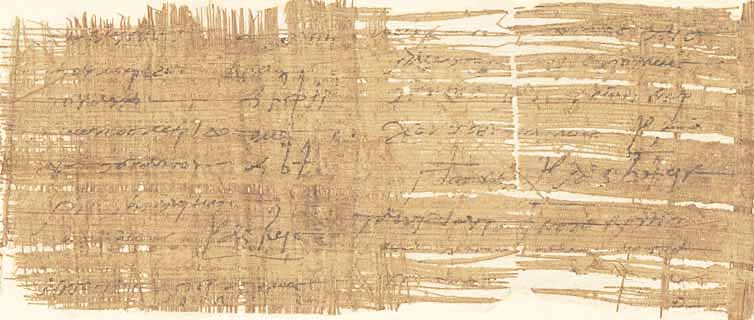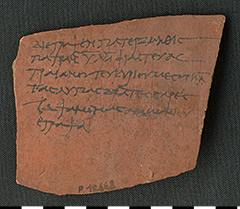SB VI 9545 Nr. 14 (P. 12668)
Even in ancient times, most citizens had to pay highly unpopular taxes. In Egypt, for example, there was the poll tax during the Roman period. Further evidence of this annual payment is provided by a poll tax receipt, preserved on a small ostracon.
An ostracon is an inscribed clay sherd. The writing was usually applied with ink. At that time, ostraca alongside wood and papyrus were equally popular writing materials, as broken pottery vessels were available in abundance and they were cheaper than papyrus, for example. The text that was written on the sherd only after the vessel had been broken usually had nothing to do with the original object.
The clay sherd was discovered on Elephantine Island in the Nile. The leader of the excavations from 1901 to 1907 was the German classical archaeologist Otto Rubensohn. Elephantine is located in the south of Egypt and used to be an important defence point against Nubia. A fortress was also built there, as well as a settlement for the soldiers and their families. Due to its favourable location as an island, Elephantine also served as a trading base.
The receipt on the ostracon can be dated to the 25th July of the year 98 AD, since the six-line text mentions, in addition to the month and day, that it dates from the first year of the reign of the Roman Emperor Trajan. On the ostracon is a receipt for the remaining instalment of the poll tax, which at that time amounted to 17 drachmas in Elephantine. The last instalment of 4 drachmas was paid by a man named Paterzmethis, son of Patransnuphis. The scribe and tax collector who wrote the receipt was Psansnos, son of Ammonius. Psansnos is already known from other texts. While the text is grammatically correct, there are spelling errors in each ending of the genitive. This could be due to the fact that Psansnos wrote as he pronounced words.
One should also clarify the meaning of the poll tax. The poll tax had to be paid by every Egyptian between the ages of 14 and 65. But of course there were exceptions. Those who had Alexandrian citizenship did not have to pay. So some of these could also be Egyptians. A certain regulation applied to non-privileged Greeks or Romans who did not have Alexandrian citizenship, for example those who were related to Egyptian families. Again, Egyptian priests also had a different arrangement. In general, there were many different taxes at this time, of which the poll tax was probably the most important.
Although this ostracon is only a small and short poll tax receipt, it still gives one an insight into how similar today’s tax and the poll tax from antiquity are. It also describes the importance of ostraca as a means of writing and how often they were used.



